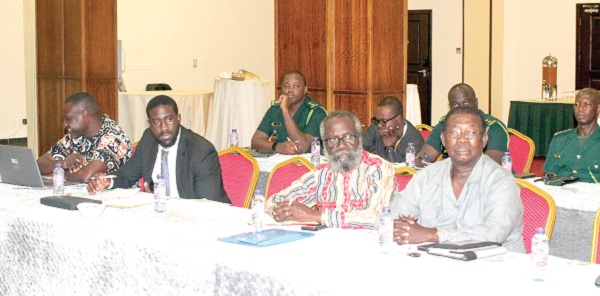
AFRICAN governments have an obligation to protect their citizens who migrate abroad from exploitation, a former Deputy Director-General of the International Labour Organisation (ILO), Dr Mary Chinery-Hesse, has said.
She said until African governments were able to make their countries attractive to discourage their citizens from leaving, they owed it a duty to protect the migrants.
According to Dr Chinery-Hesse, the youth could not be blamed for leaving their countries, in spite of the difficulties and the dangers associated with migration.
"As the world gets tougher, people will move, so it is urgent we look at how we can provide guidelines and the legal framework to guide migration in Africa," she said.
Dr Chinery-Hesse said this at a forum on fair and ethical recruitment of international labour through safe and well-managed migration.
It was organised by the International Migration, Policy, Recruitment and Advisory Centre (IMPRAC), the Board of Directors of which she is the Chair.
The IMPRAC is a registered non-governmental organisation with particular focus on assisting migrants and potential migrants and their families to make timely and informed decisions about their migration adventure.
Established by retired international civil servants, national civil servants and migration experts, the centre also provides a structured platform for the facilitation of fair and ethical recruitment for decent work abroad.

Critical look
Dr Chinery-Hesse, who is also the Chancellor of the University of Ghana, Legon, further called for a critical look to be taken at migration problems in Africa, especially around this period of global difficulties arising mainly from the COVID-19 pandemic and the Russia-Ukraine war.
“Labour mobility has direct contribution to national labour market needs and economy.
They are key pillars within the continental integrative agenda of Africa.
“We have to think collectively about how to handle migration problems, such as the point of recruitment and the difficulties migrants face on their way.
“If you take Ghana and consider the trips people make across the Sahara and what they go through trying to get to Europe, there is a lot of work to be done,” she said.
Economic globalisation
The UN Resident Coordinator in Ghana, Charles Abaani, said the growing pace of economic globalisation had created more migrant workers than ever before, with 281 million people, representing 3.6 per cent of the world’s total population, living outside their countries in 2020.
In 2019, he said, 970,600 Ghanaians departed the country, with majority headed to the US, the UK, Cote d’Ivoire and Nigeria.
“With the COVID-19 pandemic and global crises impacting economic stability, these numbers are set to rise further.
“Migration has long been used as a means of coping with poverty for many families, allowing them to invest resources and influence the migration decisions of household members,” Mr Abaani said.
The Chief Executive Officer of IMPRAC, Charles Allan Kwenin, said the forum sought to address three key principles — SDG 10.7, SDG target 23, which speaks specifically on fair and ethical recruitment and also ensuring decent work conditions, as well as partnerships.
Pathways
In a speech read on his behalf, the Minister of Employment and Labour Relations, Ignatius Baffour Awuah, said although individuals could not be stopped from migrating, it behoved the authorities to ensure that such pathways were safe, lawful and devoid of the activities of charlatans.